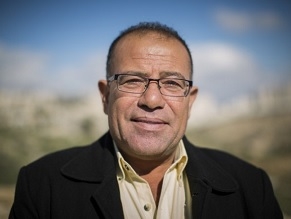|
World Jewish News

Bassam Eid, outspoken Palestinian analyst and commentator, who is founder and director of the Palestinian NGO Human Rights Monitoring Group.
|
Education to peace is crucial in the Israeli-Palestinian conflict
13.07.2017, Israel and the World Long term education to peace is a crucial issue when it comes to reaching an agreement between Israel and the Palestinians, Palestinian and Israeli experts told an international seminar with the participation of some 40 journalists organized by Europe Israel Press Association (EIPA) in Brussels.
‘’This dimension was always neglected by both sides and the moderator,’’ said Michael Herzog who has took part in each and every round of peace negotiations since the nineties and the Oslo agreements. ''We had then an agreement called ‘’people to people’’ which never materialized because the Palestinians didn’t want to normalize relations with Israel before any solution,'' he added.
‘’This culture of peace is the critical issue. It is not only about signing an agreement between two governments. You need to educate the people,’’ Herzog, an associate researcher at the Washington Institute for Near East Policy, stressed.
Bassem Eid, an outspoken Palestinian analyst and commentator, who is founder and director of the Palestinian NGO Human Rights Monitoring Group in East Jerusalem, agreed with this. ‘’Yes absolutely, this is one of the major problems,’’ he said in an interview with European Jewish Press.
‘’If the European Union who is funding the education system and the schools under the Palestinian Authority, is not going to evaluate their curriculum, which is not educating to peace, it means that Europe becomes part of the conflict rather than part of the solution,’’ Eid added as he criticized the EU’s role of providing a ‘’blind support’’ to Palestinian Authority Chairman Mahmoud Abbas.
‘’In my opinion the EU is playing a bad role. It so strongly supports Abbas – and not the Palestinians - in a way that is not contributing to the peace process,’’ Eid said.
‘’The EU is even not interested in seeing new Palestinin elections and don’t push for it because Abbas told them that he would loose them to Hamas.’’
He continued‘’The Palestinian leadership is holding its own people as hostages for the Israeli-Palestinian conflict. As long as Fatah and Hamas are divided from each other, forget any kind of opportunity for resuming peace negotiations between the Israelis and the Palestinians. That because of the Palestinians not the Israelis. It looks like the Palestinian leadership today is even not interested in a two-state solution. They are much more interested in a three-state solution : one Islamic emirate in the Gaza Strip, the empire of the West Bank under Abbas and the State of Israel. This is how unfortunately we are living in the past ten years and that is showing a lack of goodwill of the Palestinian leadership to resume any kind of negotiation with Israel.’’
Six months after the Trump administration decided to make a deal between Israel and the Palestinians a '"priority'', the parties do not know what they really want, Michael Herzog noted.
Since the last round of negotiations failed in 2014, things have changed. ''Israel's Prime Minister has today less maneuvering room than several years ago because of the nature of his coalition, the Palestinian side is totally divided between the West Bank and Gaza, Mahmoud Abbas lost legitimacy in tne eyese of his people and we have seen a rapparocheement of Israel and regional powers such as Egypt, Jordan, some Gulf States based on a common fear for instability,'' the veteran peace negotiator said.
He acknowledged that there are real gaps between the two parties regarding the core issues. ''Those who say that the gaps are minor are not serious.''
Europe Israel Press Associaiton helps media and opinion makers in their daily work to better understand the complexities of Israel and the Middle East. It organizes press trips in Israel on various thematics as well as briefings with top experts in European capitals.
EJP
|
|
